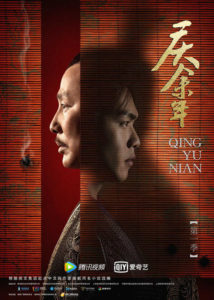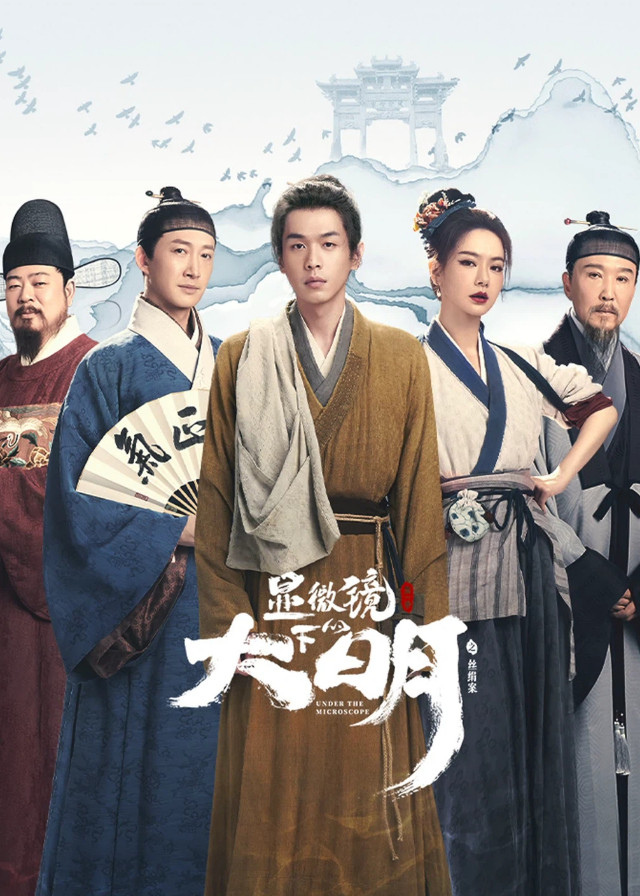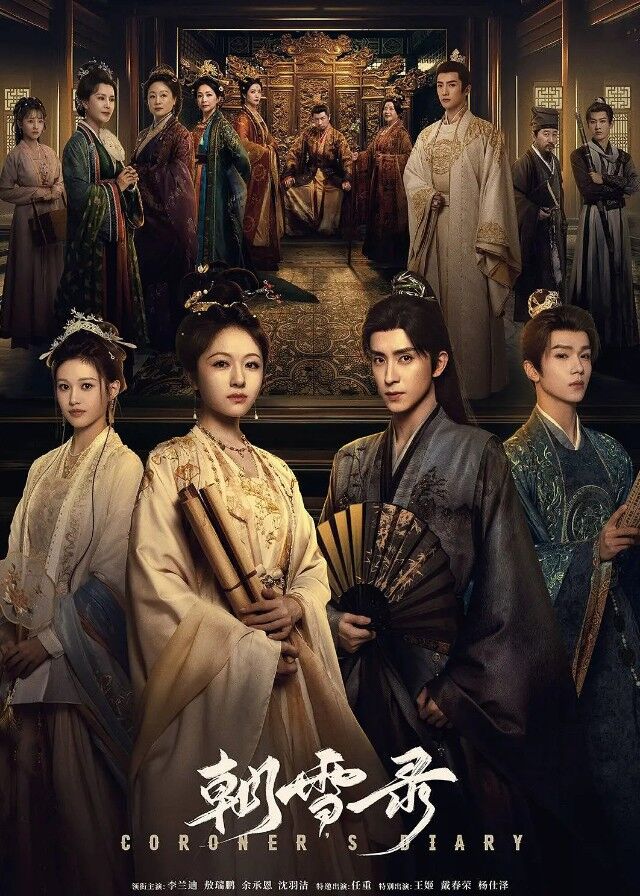Under the Microscope Episode 10 Recap
> Under the Microscope Recap
Feng Baoyu returned home and eagerly ate the meal prepared by his sister, Feng Biyu, stating he needed to finish quickly to accompany Shuai Jiamo that afternoon. Feng Biyu, concerned for him after the hardships of the Silk Poll Tax case, urged him to withdraw from the complicated matter. She expressed that fame and reputation were secondary to his well-being and encouraged him to live his life as a carefree rich young master, even offering to fund his gambling habits.
However, Feng Baoyu declared his intention to stop gambling and start studying. He then recalled the name of a book, "Complete Works of Silk," which he remembered was written by his father, and an unidentified old man confirmed they had read it. Later, Master Fan and Ma Wencai hosted a celebratory banquet, jovially interacting with others while pointedly ignoring Cheng Renqing, who sat by himself, drinking silently.
Ma Wencai eventually approached Cheng Renqing, pouring him wine and insincerely offering to visit the grave of Yun Niang, Cheng Renqing's deceased wife. Cheng Renqing, visibly angered, retorted that Ma Wencai’s father had used underhanded tactics in the imperial examination, leading to Cheng Renqing's downfall.
Ma Wencai, unfazed, countered by questioning Cheng Renqing's accusations and then further humiliated him by comparing their different fates since that examination, saying he had been "reincarnated as a human" while Cheng Renqing had become a "beast." Despite his intense fury, Cheng Renqing suppressed his anger. Before leaving, Ma Wencai reminded Cheng Renqing that he would need him to be at the forefront that afternoon and advised him to eat well.
The following day, Prefect Huang announced that the Silk Poll Tax case would continue. As Shuai Jiamo came forward, Cheng Renqing once again attempted to intervene, but Prefect Huang sternly dismissed him, instructing Shuai Jiamo to proceed. Shuai Jiamo explained that while the original Jin'an Prefecture supplement of 6,000 bolts of silk, valued at 3,530 taels of silver, was initially shared equally among eight counties, the proportion had gradually shifted since the twelfth year of the Chenghua reign.
Through a subtle accounting manipulation over four years, Renhua County was made to pay an additional 3,530 taels in taxes, with the tax category subtly changed to the Silk Poll Tax. Magistrate Fang and others expressed astonishment at this clever "boiling frog" scheme, marveling at how Renhua had unknowingly borne the extra burden. Prefect Huang then declared that since the Silk Poll Tax was an altered imposition, it should be rectified to restore fairness.
Cheng Renqing again objected, suggesting the matter was too old to hastily re-evaluate, especially given the changes in Jin'an's counties over more than a century. He argued that simply reapplying the old equal split would be unfair due to changes in population and cultivated land. Censor Liu then proposed re-measuring fields and adjusting the tax split based on new statistics, which Prefect Huang agreed to.
However, Cheng Renqing once more tried to disrupt proceedings, questioning Shuai Jiamo’s motives and implying he sought personal revenge for his father’s past injustice. He warned that setting such a precedent, especially with Shuai Jiamo going unpunished, could destabilize Jin'an Prefecture, invoking the hierarchy of 'common sense, human emotion, integrity, public interest,' with common sense taking precedence and public interest ranking fourth. Prefect Huang, exasperated by Cheng Renqing's constant interjections, ordered him removed.
At this point, Censor Ma Wencai, who had been observing, interjected. He asserted his right to speak, explaining that although he oversaw the Jin-Qu Military Defense Circuit, he was still part of the Judicial Commissioner's establishment, thus making inquiry into legal cases and prohibiting malpractice part of his duty. He then recounted the story of Xiao He's wisdom in collecting vital records during the Qin dynasty, emphasizing the importance of accurate data for effective governance.
Ma Wencai expressed his strong support for re-measuring the fields and reforming the tax system, aligning with the Imperial Court's push for political reforms, but also warned that he would not hesitate to impeach anyone who acted inappropriately.
After confirming the agreement of the two county magistrates, Prefect Huang formally announced that in three days, all eight counties of Jin'an would commence re-measuring their cultivated land to prepare for the restoration of the original Silk Poll Tax system, requiring all officials to make diligent arrangements. After the session, Censor Ma Wencai suggested to Prefect Huang that Cheng Renqing should be punished for his disruptive behavior and attempts to destabilize the prefecture.
Magistrate Mao also chimed in, disowning Cheng Renqing as merely a clever lawyer. Prefect Huang then declared Cheng Renqing guilty of inciting lawsuits and deceiving the public, ordering him to be caned ten times, expelled from the county academy, detained and sent back to Lanxi for self-reflection, and banned from practicing as a lawyer in any county or prefecture office.
As Cheng Renqing was being dragged out, he realized with dawning horror that Ma Wencai and Master Fan had conspired to set him up, intentionally using him to create a scene and incur punishment. Ma Wencai approached Cheng Renqing as he was being caned, confessing that he had deliberately framed him during the imperial examination years ago, not just to steal his top spot, but to utterly destroy his career, leaving him no chance of recovery.
He callously remarked that Yun Niang would be unable to rest in peace if she knew the man she chose had become such a loser. Afterward, Cheng Renqing, still reeling from the caning, received news from his subordinate that the old clerk from the Lanxi Archives had died in prison by hanging, leaving a suicide note claiming he accidentally caused the fire and blamed Shuai Jiamo and Feng Baoyu out of fear.
The subordinate noted that the arson case was now conveniently closed, and no one cared if it was truly suicide, but Cheng Renqing, in his pain and disillusionment, muttered that he didn't believe it. Later, Master Fan and Lu Feilong intercepted Cheng Renqing. They confronted him about leaking information to Feng Biyu, which had led to the current investigation, and also about his act of personally rescuing Shuai Jiamo and Feng Baoyu from the Lanxi Archives fire.
Cheng Renqing realized he had been betrayed by his own people. Master Fan expressed his disappointment and instructed his men to "educate" Cheng Renqing further. The once-proud Cheng Renqing lay bruised and broken. Later, Shuai Jiamo appeared and brought him to a room, applying ointment to his wounds, which Shuai Jiamo mentioned was Feng Biyu's, also used for curing ham. Cheng Renqing noted that it was Feng Biyu's ointment.
He then provoked Shuai Jiamo by suggesting his pursuit of the Silk Poll Tax case was simply a quest for parental revenge, pointing to a calculation of "3530" written on the wall. Shuai Jiamo calmly denied it, stating it was merely about correcting a tax error, not revenge.
Cheng Renqing, bewildered as to why Shuai Jiamo had saved him after their public confrontation, was told that it was because many of his statements were incorrect, and Shuai Jiamo wanted to clarify. Cheng Renqing mused that Shuai Jiamo was truly a "dummy," an uncommon person who didn't operate by the conventional principles of reason, human emotion, integrity, and public interest.
He acknowledged, however, that Shuai Jiamo was now the only one willing to attend to him in his fallen state. Cheng Renqing then began to recount his past. His father, a military officer, had taught him an intricate field-measuring technique called the "Art of Gathering Projected Steps," though he could no longer recall the precise formula. Raised with strict discipline and martial arts training, he entered the academy with fervent ambition to reform society.
There, he met and fell in love with Yun Niang, the principal's daughter. Their life together, though modest, was beautiful. Yun Niang even spent all her savings to buy him a horse named "Cloud" to ease his travels. He had planned to win the imperial examination to give her a life of comfort, but Ma Wencai's sabotage derailed his ambitions. Despite this setback, Yun Niang remained devoted. Tragedy struck when Yun Niang fell gravely ill, draining all their savings.
Desperate for money to buy medicine, Cheng Renqing reluctantly began writing legal complaints for others, earning a generous reward. However, fate was cruel, and Yun Niang's illness proved fatal. He recited a poignant poem about floating white clouds, lamenting their ephemeral existence. Separately, Feng Baoyu urgently sought out Chief Bookkeeper Ren by a river where officials were discussing irrigation plans for Hongchuan River.
Feng Baoyu asked about the "Complete Works of Silk," but Chief Bookkeeper Ren, initially dismissive and stating his own opposing stance on the Silk Poll Tax case, urged him to have Shuai Jiamo drop the matter. He reasoned that fame and fortune were external things, and living happily was paramount. Feng Baoyu passionately countered, explaining that for Shuai Jiamo, happiness was intertwined with remembering his parents.
He revealed that Shuai Jiamo, having lost his parents at seven, endlessly calculated and solved problems as his only means to recall fragments of his parents' memory, as the archive fire had destroyed all their mementos. Chief Bookkeeper Ren, moved by this revelation, admitted he had only heard rumors about Shuai Jiamo's past. He praised Feng Baoyu's dedication to Shuai Jiamo, whom Feng Baoyu called a brother he could trust with his life.
Soon after, an urgent report from Jin'an Prefecture arrived, prompting Chief Bookkeeper Ren to realize a "good plan" had been executed, and the entire Jin'an region was now poised for chaos. An official notice was promptly posted, announcing the immediate re-measurement of all cultivated land in Jin'an's eight counties to reformulate land numbers, instructing all officials and civilians to proceed diligently without delay or error. The surrounding populace quickly gathered, discussing the implications with growing concern.











